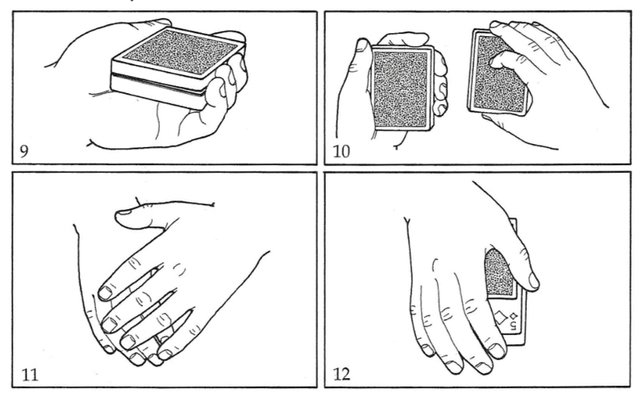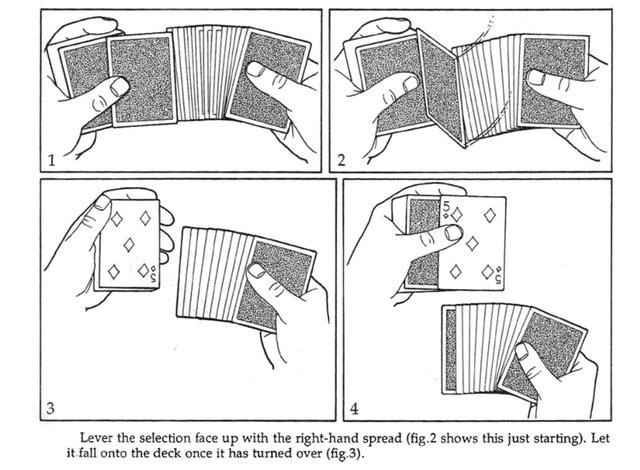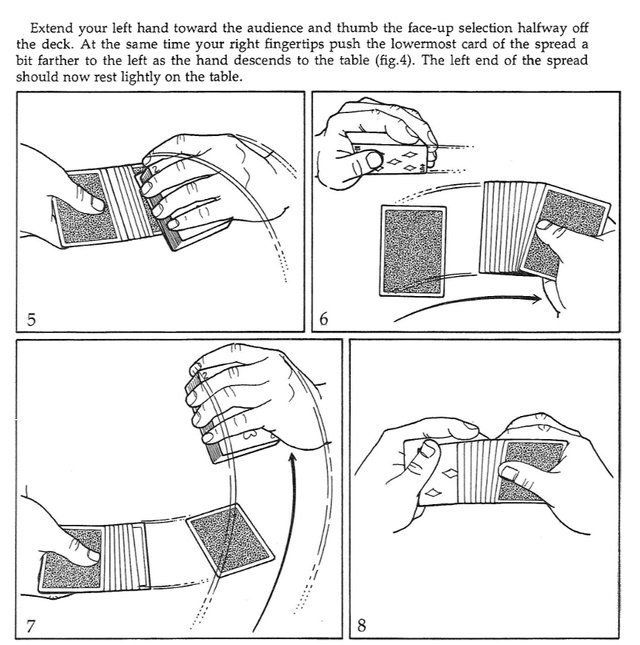CARD PING CHIEN
CARD PING CHIEN
EFFECT
Shigeo Takagi is the single most influential person in modern Japanese magic. While en- gaged in a full-time career with the Japanese Library of Congress, he has also managed to write over seventy-five books on magic and the allied arts. His finest routines are currently being prepared for publication by Richard Kaufrnan in a new book, The Very Best of Shigeo Takagi. "Card Ping Chien" is a universally applicable card switch which occurs as the selected card is laid face down on the table during a natural action.
PERFORMANCE
The face-down deck begins in dealing position in your left hand. Spread the cards be- tween your hands and ask a spectator to point to a card. Break the spread at that point, your right hand taking all the cards above the indicated card - these remain spread. Your left hand squares its cards, with the chosen card on top. Using your left thumb, rightjog the selection and move the Ieft end of the right hand's spread of cards beneath it (fig.1). Lever the selection face up with the right-hand spread (fig.2 shows this just starting). Let it fall onto the deck once it has turned over (fig.3).
Extend your left hand toward the audience and thumb the face-up selection halfway off the deck. At the same time your right fingertips push the lowermost card of the spread a bit farther to the left as the hand descends to the table (fig.4). The left end of the spread should now rest lightly on the table.
Several things now happen in quick succession. Begin by turning your left hd palm down directly over the left end of the right-hand spread as if about to thumb the selection onto the table (fig.5). At the same time your left thumb pulls the face-up sektion flush with the deck and, also simultaneously your right hand moves to the right leaving the lowermost card of the spread on the table (fig.6). Your palm-down kft hand continues moving toward you as soon as the right hand has left its card behind (fig.7). The illusion, and a perfect one it is, exactly simulates the left hand &opping the selection onto the table and moving away afterward. It must be done smoothly to achieve the proper visual retention. At this point the selection is actually face-down beneath the face-up left- hand cards. Continue by raising your right hand and turning it palm down. Place its cards beneath the left-hand cards, burying the reversed selection (fig.8). Obtain a left pinky break above the reversed selection as the deck is squared and the left hand turns palm up. The deck is back in normal dealing position with a pinky break at center above the face-up selection. Your right hand grasps the deck in Biddle Grip, your right thumb letting one card riffle off its tip, onto the face-up selection (fig.9). Immediately cut all the cards above the break to the table (fig.10). Your right hand picks up the single face-down card resting on the table, thought to be the selection, and places it atop the just cut-off packet. Complete the cut, your right hand lifting the lower half of the deck out of your left hand and placing it onto the half already on the table.

The selection is now face up beneath the top card of the deck. Takagi will usually end the routine one of two ways. If sitting, he uses Ed Marlo's "Rise, Rise, Rise" steal from The Tabled Palm. If standing he uses Jerry Andrus' "Startling Color Change" from Andrus Card Control. The Erdnase "First Transformation" from The Expert At The Card Table will also do nicely Here is a brief explanation of the Marlo sleight. Both palm-down hands move over the deck and cover it for a moment (fig.11). The right hand descends first and grasps the top card of the deck in Angle Palm, held between the thumb and pinky base. Figure 12, where the left hand has been removed for clarity reveals how the card is held in the right hand. Both hands then separate and move immediately to the table edge where the card is al- lowed to fall into the lap.

